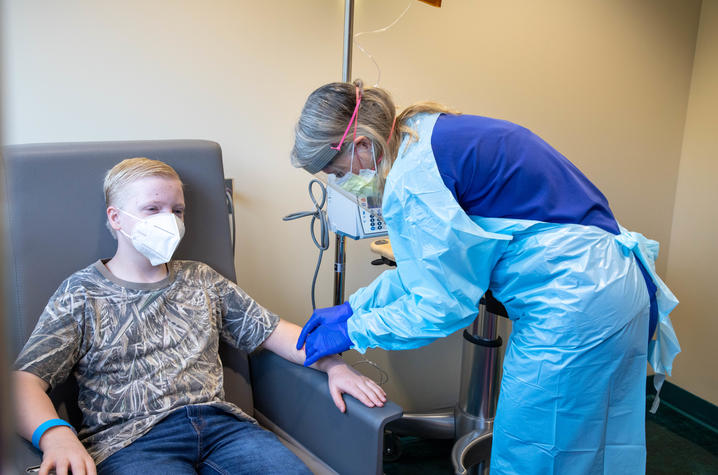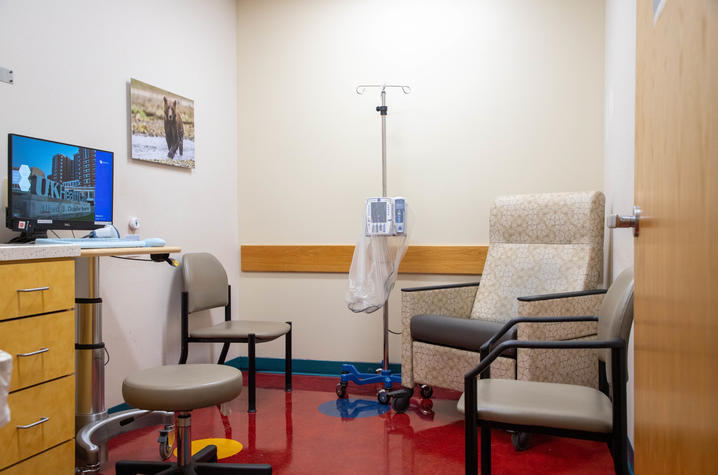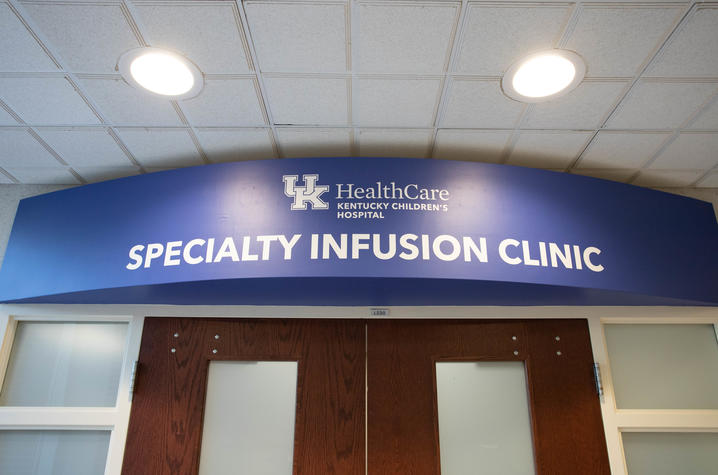New Pediatric Specialty Infusion Clinic Provides Monoclonal Antibody Therapy to Treat COVID-19 in Children
LEXINGTON, Ky. (Oct. 1, 2021) – When staff and providers at Kentucky Children’s Hospital were charged with the task of setting up the primary site for pediatric monoclonal antibody therapy in Kentucky, they transformed an empty clinic space into a state-of-the-art infusion clinic. And they did it in just nine days.
“This whole space was a former clinic space that was being used for office space and storage,” said Matthew Horn, director of ambulatory clinical operations for Kentucky Children’s Hospital. “Everyone, from clinic staff to maintenance staff stepped up and transformed it into a place where we can administer life-saving treatment to children.”
The Specialty Infusion Clinic will serve as the primary state site for pediatric COVID monoclonal antibody infusions. Located in UK HealthCare’s Kentucky Clinic, staff can administer monoclonal antibody therapy to up to 26 patients a day.
Monoclonal antibodies, which have emergency authorized usage from the FDA, are similar to the antibodies your immune system would produce in response to an infection. They are mass produced and designed to target the coronavirus. The therapy is used to bolster the body’s own immune system to fight the virus but is not meant to be a substitution for the COVID-19 vaccine.
“This treatment is authorized in patients who are 12 and older – children who are old enough to be vaccinated,” said Sean McTigue, MD, interim chief of pediatric infectious diseases at KCH. “The infusion can prevent serious illness and hospitalization, but the vaccine is still the first and best line of defense.”
Patients ages 12 to 17 who test positive for COVID or have had a known exposure are eligible to receive infusions if they have high-risk factors such as:
- Obesity or being overweight (body mass index greater than 85 percent for their age and gender on CDC growth charts)
- Chronic kidney disease
- Diabetes
- Immunosuppressive disease or immunosuppressive treatment
- Cardiovascular disease, including congenital heart disease
- Sickle cell disease
- Pregnancy
- Chronic lung disease including moderate to severe asthma, interstitial lung disease, cystic fibrosis and pulmonary hypertension
- Neurodevelopmental disorders such as cerebral palsy, genetic/metabolic syndromes, severe congenital anomalies
- Patients who are dependent on medical technology such as tracheostomy, gastrostomy, positive pressure ventilation not related to COVID-19
The Infusion Clinic has 13 infusion spaces with two rooms that can accommodate siblings. The infusion itself takes 30 minutes, but families can expect to spend about three hours at the clinic.
The Specialty Infusion Clinic is located at the Kentucky Clinic. Hours of operations are 3-9 p.m., Monday through Friday. This clinic, as well as the facility for adults, only accepts patients by referral. Please contact your primary care provider for a referral.
To get a COVID-19 vaccine, visit www.kycovid19.com to find vaccination site near you.
As the state’s flagship, land-grant institution, the University of Kentucky exists to advance the Commonwealth. We do that by preparing the next generation of leaders — placing students at the heart of everything we do — and transforming the lives of Kentuckians through education, research and creative work, service and health care. We pride ourselves on being a catalyst for breakthroughs and a force for healing, a place where ingenuity unfolds. It's all made possible by our people — visionaries, disruptors and pioneers — who make up 200 academic programs, a $476.5 million research and development enterprise and a world-class medical center, all on one campus.







